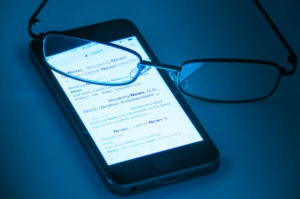
This laboratory research is not a reason to stop using your screens. When asked by The Vergewhether his research showed that using electronic screens causes blindness, Ajith Karunarathne, PhD, lead author of the study, replied, “Absolutely not.”
The research comes from the University of Toledo and was published in Scientific Reports. The researchers were looking at what happens when a specific chemical, retinal, is exposed to blue light. Retinal is present in the eye. And blue light enters the eye, both naturally in sunlight and from electronic screens. But the study’s findings cannot be turned into recommendations for real people in the real world.
Janet R. Sparrow, PhD, who is the Anthony Donn professor of ophthalmic sciences and professor of pathology and cell biology at Columbia University in New York, offered several notes of caution about this study:
- The experiments do not mimic what happens in live eyes.
- The cells that were tested are not derived from retina cells.
- Cells in the study were not exposed to light in the way cells in the eye are naturally exposed to light.
- The part of the cells that was affected by retinal in the experiments (the cell membrane) does not touch retinal in the eyes of living people.
- Retinal is toxic to some cells whether or not it’s exposed to blue light. Live retina cells have proteins that can protect them from these possibly toxic effects.
- Other cells that were also exposed to retinal and blue light by the investigators would not be exposed to blue light in the body. Blue light only reaches the skin and the eyes. It cannot have any effect deeper in the body.
In other words, the researchers took cells that are not from the eye, put them together with retinal in a way that doesn’t happen in the body and exposed the cells to light in a way that doesn’t happen in nature.
Real Concerns About Screen Use and Eye Safety
If you have questions or concerns about your eye health, you should talk to your own ophthalmologist. Your doctor can make recommendations that are right for you and your lifestyle.
There is evidence that blue light can interfere with humans’ circadian rhythms, making it harder to fall asleep. For some people, it can be a good idea to limit screen time before bed. Or to filter out blue light from screens before bedtime.
Spending too much time looking at a screen can keep people from blinking as often as they should and from focusing on things at different locations. This can make the eyes feel dry, gritty, tired or strained. The simple solution is to look at least 20 feet away, for 20 seconds, every 20 minutes. Ophthalmologists call this the ‘20-20-20’ rule.
Originally published Aug. 15, 2018. Updated Aug. 20 to include comment from Dr. Karunarathne




